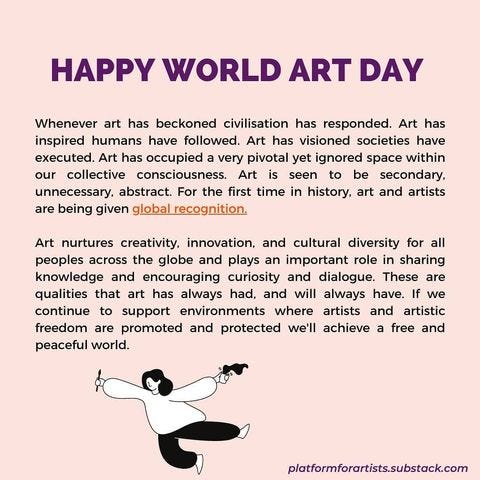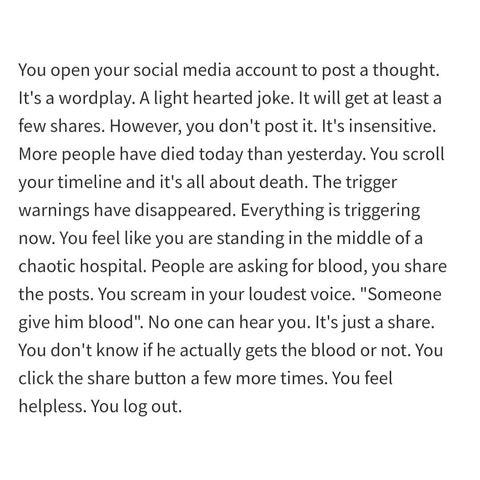There are not many absolute truths.
Reality is mostly constructed on multiple, shifting perceptions based on relatively few scientific facts.
Dear Friends
Firstly wishing you a belated happy World Art Day!
Let’s not sugarcoat it, we know this is a very hard time. To talk about creativity and art while there are all-time high COVID-19 cases, while the health system in the country is falling apart, while there are indifferent politicians doing political rallies, is a devastating privilege. And for better or for worse we have that luxury, we yield a kind of power, we owe some responsibilities, to ourselves and to the community.
We are living in hard times, but you must keep creating. That’s the only way you can sustain yourself, not economically but spiritually and morally. Art is the only thing that will keep you sane when you are surrounded by the numbness, the uncertainty of all. Art in times as hard as this becomes an act of self-preservation. It acts as a moral compass and a source of strength.
But you must also keep creating for others out there. For people who are navigating pain and trauma more intimately than you are.
Art has its unique way of evoking joy and empathy. Art in times as hard as this also becomes an act of social service.
It empowers the fallen and brings people together.
“In the 2000s, before India’s cheap smartphone and data revolution, grew more popular than texting. The missed call emerged in India as a critical means of communication for those who counted every rupee spent on recharge credit. But the practice soon spread, became trendy, and, even as call rates plunged in the 2000s to among the lowest in the world, evolved into a general tool of convenience: a missed call could mean “I miss you,” “Call me back,” or “I’m here.”
The story of ZipDial’s success and its subsequent downfall is a testimony to the fast-changing and ever-growing tech infrastructure in India. It was launched in 2010 with the ambition of bridging the gap between online and offline.
It was beguilingly simple: a customer would call a hotline, the phone would ring twice and automatically disconnect, and the system would reply within seconds with dynamic content, such as match scores, through a call or texts.
“I love tech. But watching it intersect with a Hindu nationalist government trying to crush dissent, choke a free press, and destroy a nation’s secular ethos doesn’t feel like something I bought a ticket to. Writing about technology from India now feels like having a front-row seat to the country’s rapid slide into authoritarianism. “It’s like watching a train wreck while you’re inside the train,”
Reading this article felt like I was reading the pages of some George Orwell book! But as it turns out, democracy is only a myth now and the world of the internet, the only source of escape and dissent, has crumbled down too. Sometimes I am bewildered by the desperate state we are in, a country where tech employees have to “ figure out who is at risk of going to jail if the government cracks down.”
As we all know it was Ambedkar Jayanti on the 14th and naturally I thought of reflecting back on his legacy and philosophy. And this is a brilliant piece to start with if you want to know about the most radical man in Indian history who “has been made into a safe rather than disconcerting figure. He is an object of consensus when it comes to invoking a figure to be revered. In truth, he is at the heart of the most fundamental conflicts over the soul of India.”
He is the yardstick to which a whole civilization must measure up. We don’t judge him by our ideals; he should be the ideal by which we judge ourselves. In engaging with Ambedkar, the question is not of assessing him; it is of assessing ourselves and trying to understand why we continue to avoid confronting his bracing call to justice, his advocacy of reason, the depth of his institutional imagination. He is the mirror in which we dare not look at ourselves; his presence is a constant reminder of our bad conscience and bad faith.
Welcome to the non-fungible, memeified, cryptodenominated, degenerate future of finance.
“For all the ways that this particular moment in the history of markets feels strangely futuristic — computer dollars buying cyberart on the digital marketplace! — the basic dynamic at work here is a recognizable one. There are a lot of suckers who want to get rich fast without much work. The economy has always been weird; it’s an aggregation of human behavior, and humans are weird.”
“The art shown on the bottles ranges from contemporary, modern, abstract, and more. As true aficionados of the art industry, Trust Me is looking to expand from just working with painters to working with those in fashion, film, music, and more.”
Trust Me Vodka, is a unique brand with a brilliant thought behind it. It features artists in order to celebrate their creativity and oeuvre. It is an initiative to provide a platform for artists to embrace their talents alongside passing a message.
Do you think social media can cause a higher risk of depression? Then be beware, because you sound just like 19th-century ‘experts’ who thought that riding the cycle could give women the “bicycle face”. Read this article that illustrates how social media is hardly the culprit when it comes to adolescent mental health problems and how we are blind-sighted by it.
“Instead of panicking about teens’ social media use, what if we focused on sleep and family? In other words, what if we paid attention to the real problems? But we don’t, because the real problems rarely make viral headlines. In the coming years, the moral panic over social media will likely continue to distract us from those more important, less sensational problems.”
“The shift to a hybrid world of work means that some fanciful predictions from early in the pandemic will not come to pass. “Remote-only” companies will remain a small minority. Firms will continue to “onboard” new staff in an old-fashioned way—they can do it in an office, rather than by video-link—while junior staff will still have an opportunity to skulk by the lifts in hopes of grabbing five minutes with the chief executive. Cities will not empty. Firms will not swap their full-time staff for freelancers, which might be tempting if the workforce were wholly remote.”
Do you ever just walk into a room and completely lose track of what you wanted there? Yep, that’s actually a “sciencey” thing called brain fog, when our cognitive mechanisms don’t function efficiently.
It’s a common experience, but it’s very complex, I think it is the cognitive equivalent of feeling emotionally distressed; it’s almost the way the brain expresses sadness, beyond the emotion.
This week on Pepper Spotlight, the weekly podcast by Pepper Content, Pratik Poddar, the Principal at Nexus Venture Partners was in conversation with Pawan Rochwani about the evolution of platforms and the changing landscape of content creation.
Came across this piece that quite well resonated with the uncertain but privileged space we currently inhabit. It is important that we on an individual level stop including in foolish practices and maintain all precautionary measures to battle the crisis at hand. Take care, stay safe!
Before I say goodbye this week, a very big announcement!
Last month we could not have our community event and so my team and I were very bummed out. We have decided to make it up to you by planning a really fun yet deep conversation with Ramit Verma, the brain behind Official Peeing Human and Kroordarshan! Join us on the 25th of April at 12 pm on “What We Don’t Understand About the Indian Media?” in collaboration with Bolti Bandh.
This is going to be an exclusive event for our paid-only members, so subscribe to our paid membership to participate in the event. We will let you know more about the event on our social media handles so follow us there to stay updated.










